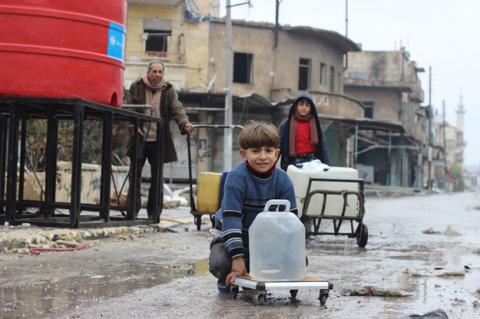Syria

[As] if it needs repeating, civilians need food, medicine and other life-saving items. They need access to basic services. That gives them a chance to live a dignified life. And they need protection from harm. To achieve this, we need to expand access. We need the funds for sustained humanitarian operations. And we need to scale up, and we will play our part in this, to scale up early recovery programmes.
Martin Griffiths, UN Humanitarian Affairs and Emergency Relief Coordinator, in briefing to Security Council, 27 January '22
Overview
Since the conflict erupted in March 2011, Syria has witnessed unprecedented devastation and displacement. More than 6 million Syrians have fled the country and 6.7 million are internally displaced. With more than 14 million people continuing to be in need of assistance, the conflict has caused untold suffering for Syrian men, women and children.
UN News Reports on Syria
Click here for news coverage on Syria.
Impacts of Conflict

- The Syria crisis, currently in its 11th year, remains the largest displacement crisis in the world. Children are bearing the brunt of the 11-year-old conflict in the Syrian Arab Republic. Over 13.4 million people (6.1 million children) require assistance and 7 million people are internally displaced (3.1 million children).
- In 2022, 14.6 million people need humanitarian assistance, an increase of 1.2 million from 2021.
- Despite receiving only 46 per cent of the required funds for the 2021 Humanitarian Response Plan, Syria remains one of the largest humanitarian responses in the world, with assistance delivered to 6.8 million people on average per month in 2021.
- With the devastating impact of the COVID-19 pandemic and increasing poverty, every day is an emergency for Syrians forced to flee.
- Syria ranks among the 10 most food insecure countries globally, with a staggering 12 million people considered to be food insecure.
- Some 48% of Syrian refugees within the region are female.
UN Action at a Glance

- The Security Council takes the lead on political action on Syria. In 2021, the 15-member body discussed Syria 12 times, most frequently via informal consultations. Since 2012, the Council has adopted 27 resolutions on Syria or largely related to Syria.
- The UN continues to support efforts towards a Syrian-owned and led political solution to end more than a decade of war that has killed upwards of 350,000 people and left 14.6 million in need of humanitarian aid.
- On 9 July 2021, the Council adopted resolution 2585 (2021), extending the cross-border mechanism for the provision of humanitarian aid into Syria (the first unanimous resolution on this matter since resolution 2165 (2014)).
- Humanitarian assistance by United Nations agencies and their partners continues throughout the Syrian Arab Republic.
- UNICEF requires US $334.4 million to reach children in the Syrian Arab Republic with humanitarian assistance in 2022. The greatest funding requirements are for water, sanitation, and hygiene (WASH), health and education, among others.
- The UN-led Regional Refugee and Resilience Plan (3RP) for 2021-2022 calls for $5.8 billion to support almost 6 million refugees in neighbouring countries.
- The UN Human Rights Council investigates all violations of international law in Syria, having done so since March 2011 through the Independent International Commission of Inquiry.
The UN humanitarian response
Over 350,000 people have been killed since the onset of the crisis in 2011. One in every 13 victims was a woman or a child. More than half of all Syrians have been forced to leave their homes, often multiple times, making Syria the largest displacement crisis globally. Human rights violations and abuses continue to occur in the context of widespread insecurity and in disregard of international law, international humanitarian law, and human rights law. The UN is working with partners to provide humanitarian assistance to those in need.
UN agencies & humanitarian partners
Board of Inquiry report summary
UN Secretary-General's summary of the report of the United Nations Headquarters Board of Inquiry into certain incidents in northwest Syria since 17 September 2018 involving facilities on the United Nations deconfliction list and United Nations supported facilities.
About the Intra-Syrian Negotiations

The current United Nations Special Envoy for Syria, Geir O. Pedersen, is working tirelessly to bring the parties to the negotiating table and an end to the war. Since January 2016, the Special Envoy for Syria has conducted several rounds of intra-Syrian negotiations with talks in late 2017 into 2018, focusing on two key aspects of Security Council resolution 2254 (2015), a schedule and process to draft a new constitution and the holding of elections as the basis for a Syrian-led, Syrian owned process to end the conflict.
In October 2021, talks in Geneva aimed at advancing a new constitution, failed to provide a breakthrough, but negotiations are continuing.
For all the key dates of the Syrian peace process, click here.

International, Impartial and Independent Mechanism

On 21 December 2016, the UN General Assembly established the International, Impartial and Independent Mechanism (IIIM) to "collect, consolidate, preserve and analyse evidence of violations of international humanitarian law and human rights violations and abuses and to prepare files in order to facilitate and expedite fair and independent criminal proceedings ... in national, regional or international courts or tribunals that have or may in the future have jurisdiction over these crimes".


